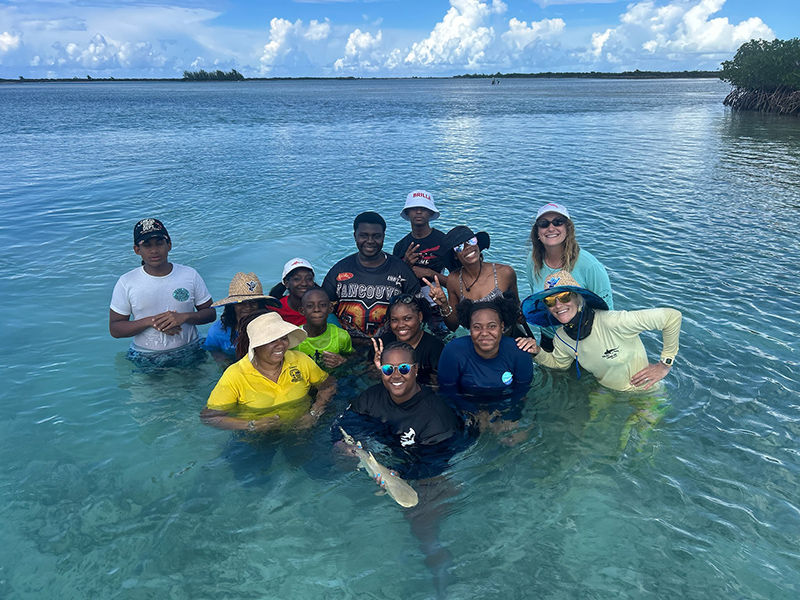Meet Marine Microbiologist and Author Dr. Jeanette Davis ( Dr. Ocean)
- Sharks4Kids

- Jun 6, 2022
- 4 min read
A dynamic author, research scientist, and diversity advocate, Dr. Jeanette Davis (also known as Dr. Ocean) has left her mark far beyond the field of science. Dr. Ocean is a Marine Microbiologist who contributes to ocean science nationally and internationally and has traveled to several countries speaking about her research and coordinating ocean science. Dr. Ocean earned her B.S. in Marine and Environmental Science from Hampton University and a Ph.D. in Marine Microbiology from the University of Maryland where she focused on marine drug discovery and is recently cited in Science Magazine for helping to discover a marine bacterium that helps fight cancer. Dr. Ocean has taken her scientific skills outside of a laboratory to live aboard research vessels for weeks at a time to study marine organism.
Thanks to Dr. Ocean for sharing her books and her work with us!

1. What is your favorite species of shark and why?
My favorite shark is the hammerhead shark. I have never encounter the shark but the unusual and distinctive structure of the head make them look cooler than other sharks. Some species unlike other sharks are known to travel in schools during the day. Overall I think they are the “outliers” because of how they look which makes them my favorite.
2. Can you tell us a little about your current work/research as a marine microbiologist?
I am a marine microbiologist which is a fancy way of saying that I study the small life in the ocean that you can’t see without a microscope. But as a moderate day microbiologist, I don’t carry a microscope to study life in the ocean. Since all life, no matter the size, have DNA, I study the DNA left behind in the environment (eDNA) to identify the small “unseen” life in the ocean. I’ve used this technique in marine drug discovery and helped identify a marine bacterium that produces an anticancer compound. I’ve also used this technique to track and mitigate invasive species which is very important since these organism causes millions of dollars in economic and environmental damage annually. Currently, I use this technique to help identify and track various fish for fisheries management.

3. Can you tell us what inspired you to write Jada's Journey? Did any particular moment in your life inspire part of the book?
I grew up loving science but would never simply utter the words, “I want to be a scientist”. I think this is true for many young people because they do not see representation of people who look like them in science and/or they are not taught to connect their inquisitive nature and desire to explore with science. I wanted to fill that void and connect young readers with science through everyday experience or activities in a diverse and inclusive way. I wanted literature that would reflect children’s curiosity and allow them to “see themselves” as scientist. This prompted me to write “Science is Everywhere, Science is for Everyone” which explores a variety of sciences for young readers, and is now available in Spanish. Being an ocean scientist is what inspired me to write “Jada’s Journey Under the Sea”. There are more books to come.

5. What has been the most challenging thing about writing books?
The most challenging obstacle I’ve encounter is publishing the book. The writing is not so difficult and as I write, I also write out the description for each page that I then provide to an illustrator. However, black contributors (authors, editors, illustrators) account for about 6% of published books and it’s a very difficult industry to come into. Having a great book doesn’t guarantee publishing. Mynd Matters Publishing is an amazing publishing and consulting agency dedicated to empowering current and aspiring writers and was instrumental in helping me publish. I was really fortunate to work with them and they were valuable in helping me overcome the challenges of publishing as a first-time black woman author.
6. What is the most rewarding thing about writing books?
The most rewarding part about writing books is to see your work in print and to witness the children who become excited about science through your work. Every Monday on my social media, I have “Picture Mail Monday” where I just highlight young people reading or taking pictures with the book. It’s very uplifting and motivation to keep doing this work.
7. What advice do you have for girls and young women interested in a career in marine science?
For those interested in a career in marine science, I would advise them to just go for it. Pursue this field simply because they want to. I want them to know that they are not limited by other’s people perceptions or views but get to show up as their authentic selves and contribute to science. I would also add to build great relationships, and find great mentors who will help you navigate the field and advocate for you.





















